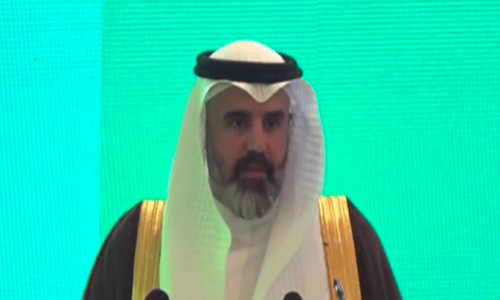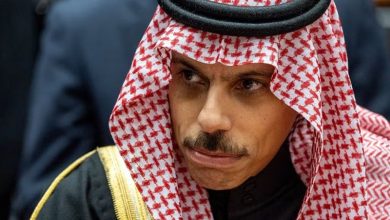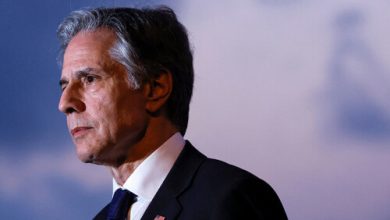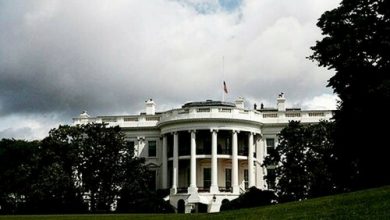Saudi Arabia considers Pakistan high priority economic opportunity, believes in its economic potential: Almubarak

Saudi government and companies consider Pakistan a high priority economic, investment and business opportunity, the Kingdom’s Deputy Investment Minister Ibrahim Almubarak said on Monday according to state broadcaster Radio Pakistan.
Almubarak made the remarks at the two-day Pakistan Saudi Arabia Investment Conference, which began in Islamabad today, after arriving in the capital the previous night with a key Saudi delegation comprising dozens of investors as Pakistan aims to court foreign investors to boost its exports in collaboration with Saudi companies.
The Saudi official said his country “believes in the economic potential of Pakistan” including its demography, location and natural resources.
He said Pakistan is a major strategic partner for Saudi Arabia. Referring to the “fraternal ties” rooted deep in common faith, culture and shared values, he said “we want to see Pakistan as one of our leading international partners.”
The Saudi minister was quoted by Radio Pakistan as saying that “the gathering provides an opportunity to develop deeper understanding of the great opportunity available for investment in Pakistan.”
He expressed his confidence that the public and private sectors of both the countries can take their partnership to the next level.
Ibrahim Almubarak mentioned that Saudi Arabia is a home to about two million Pakistanis who have contributed significantly to the Kingdom’s vision 2030.
Govt committed to move economy towards export-led growth: FM Aurangzeb
Finance Minister Muhammad Aurangzeb, in his speech at the event, spoke of the government’s “commitment to fully facilitate the private sector to take the country towards export-led growth”.
According to Radio Pakistan, he said the government was focused on bringing foreign direct investment to uplift various sectors.
Giving on overview of the country’s economic situation, the finance minister claimed it was on a positive trajectory.
He said that the country’s current account deficit will be less than a billion dollars during the ongoing fiscal year.
He said the country’s foreign exchange reserves have risen to $9 billion, adding that the local currency was stable over the last ten months while the inflation was down to roughly seventeen percent.
He said foreign investors were also entering the Pakistan Stock Exchange.
The finance minister reiterated that Pakistan was seeking a “larger and longer programme” with the IMF for permanence in the macroeconomic stability and structural reforms.
He confirmed that the IMF mission was expected in Pakistan in the “next seven to ten days” to discuss the contours of the new plan.
Petroleum, Commerce ministers emphasise economic collaboration
Petroleum Minister Musadik Malik emphasised that the private sector of both countries should participate in infrastructure development, which he said was pivotal in unleashing assets and wealth of both the countries, according to Radio Pakistan.
He also encouraged collaboration between the two countries in various sectors, including mines and minerals, tourism and agriculture.
Meanwhile, Commerce Minister Jam Kamal assured that the present government is committed to bringing a change in Pakistan’s economic landscape.
Aim high as Saudi investors arrive in Islamabad
The Saudi delegation was welcomed by Kamal and Malik at the Nur Khan airbase on Sunday, according to a press release issued by the Ministry of Commerce.
According to the commerce minister, the purpose of the visit is to enhance trade ties between investors from both countries and identify trade and investment opportunities across various sectors of national economy.
He said the ministry picked several Pakistani companies for business-to-business (B2B) meetings with the Saudi investors and disclosed that “leading” Pakistani companies would collaborate with at least 30 Saudi companies across different sectors. During the meetings, local companies will present their business and investment proposals to their Saudi counterparts.
The B2B meetings will target sectors, such as agriculture, mining, human resource, energy, chemicals, and maritime. Moreover, discussions will also cover investment prospects in other sectors, including IT, religious tourism, telecom, aviation, construction, water and power generation, he added.
The minister expressed optimism that several companies would be able to finalise business and investment deals during the B2B sessions, fostering greater economic cooperation between Saudi Arabia and Pakistan. During a recent visit, Prime Minister Shehbaz Sharif held a meeting with Saudi Crown Prince Mohammed bin Salman, as the latter agreed to expedite the first wave of a planned $5 billion Saudi investment package for Pakistan.
The information minister had termed the premier’s visit “highly successful” and said that major developments would take place within the next few months because of the PM’s trip to Riyadh. “Within a short span of just one month, the prime minister held two meetings with the Saudi crown prince which has a historic significance for the two brotherly countries,” the minister had said.
Before Shehbaz Sharif, ex-caretaker prime minister Anwaarul Haq Kakar had visited Saudi Arabia. In Sept 2023, he claimed that the Saudi government would invest up to $25 billion in Pakistan over the “next two to five years” across various sectors.
Meanwhile, an APP report cited a commerce ministry official as saying that Saudi Arabia was an oil-based economy with strong government controls over major economic activities; however, it was now undergoing a transformation to reduce oil dependence, diversify income sources, and enhance competitiveness under the Vision 2030.
Currently, the major exports of the Kingdom included mineral fuels, mineral oils, plastics and organic chemicals, whereas it was importing machinery, vehicles, and agricultural products. The official said that during the first half of the current financial year, bilateral trade between Pakistan and Saudi Arabia was recorded at over $248 million, with Pakistan’s share of exports at $262.58 million and Saudi exports at $2.219 billion.
He said Pakistan’s major exports to Saudi Arabia included rice, meat of bovine animals, fruits and vegetables, and tents and camping goods.
Follow Dawn Business on Twitter, LinkedIn, Instagram and Facebook for insights on business, finance and tech from Pakistan and across the world.





